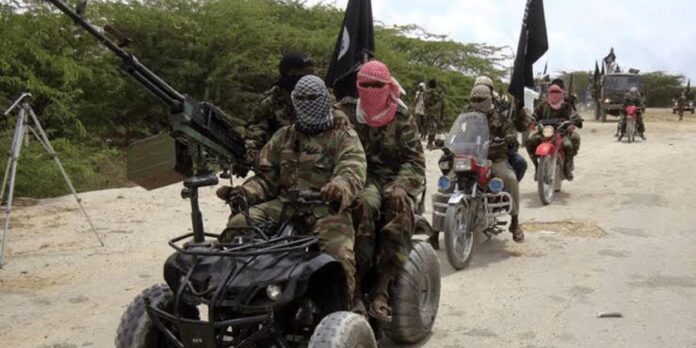The Chief of Defence Staff (CDS), General Christopher Musa, has alleged that terrorists operating in Nigeria could be receiving financial backing from foreign sponsors. This revelation raises concerns about the international dimensions of the country’s long-standing battle against insurgency.
In an interview with Channels Television, General Musa disclosed that some terrorists apprehended in the Northeast were found with foreign currencies. This, he explained, strengthens suspicions that external forces may be involved in funding terrorism in Nigeria.
“When we arrested some of them in the Northeast, they were having hard currencies to change. How did they get those monies?” he questioned during the interview.
Concerns Over Foreign Involvement
The CDS hinted that some countries might harbour envy towards Nigeria’s growth and stability, seeing its potential as a regional powerhouse.
“People don’t understand that a lot of countries are envious of Nigeria,” General Musa remarked. “I remember that some people said we were not going to survive more than 2015, but this is 2025, and we are still surviving.”
He further emphasised that not all foreign entities are pleased with Nigeria’s progress, implying that the nation’s achievements might provoke attempts to destabilise it.
“People have to understand that not everyone is happy with you, that you are developing,” he said.
Mixed Sources of Funding
While acknowledging the possibility of external funding, General Musa also noted that local criminal activities contribute significantly to terrorist financing.
He stated, “Sometimes, the bloodthirsty criminals get funding from kidnapping, armed robbery, and all these things they do, but you can’t rule out the possibility of external funding.”
This dual source of financing—both local and international—complicates efforts to curtail terrorism. Kidnappings for ransom and armed robberies have plagued many regions in Nigeria, providing militants with steady income streams to sustain their operations.
Historical Context
Nigeria has faced severe terrorism challenges for over a decade, most notably from Boko Haram and its splinter group, the Islamic State West Africa Province (ISWAP). These groups have wreaked havoc in the Northeast, causing thousands of deaths and displacing millions. Despite significant military efforts, their operations continue to threaten national security.
The suggestion of external sponsorship is not new. In the past, some analysts have pointed to the role of international networks in aiding terrorist groups. For instance, Boko Haram’s earlier affiliations with al-Qaeda and later with ISIS raised concerns about the flow of foreign resources into Nigeria.
Furthermore, the arrest of foreign nationals in connection with terrorist activities has lent credence to these suspicions. For example, reports of foreign trainers, logistical support, and advanced weaponry found among insurgents have sparked debates about the extent of external involvement.
Calls for Vigilance
General Musa’s comments come at a time when Nigeria is intensifying its fight against insecurity. His remarks highlight the importance of identifying and disrupting the financial networks that sustain these groups.
Security experts argue that a multi-faceted approach is necessary to address terrorism. This includes strengthening intelligence gathering, fostering international collaborations, and implementing robust financial regulations to prevent illicit flows.
In addition, the CDS’s claims underscore the need for increased diplomatic efforts. Building alliances with friendly nations to counter terrorism and exposing any foreign entities complicit in supporting insurgents could help mitigate these threats.
Global Implications
The possibility of foreign involvement in funding terrorism in Nigeria has broader implications for regional and global security. If proven, it could indicate a deliberate attempt to destabilise West Africa, a region already grappling with fragile economies and political unrest.
General Musa’s statement raises questions about the motivations behind such external interference. Are these acts driven by competition over resources, geopolitical strategies, or simply a desire to undermine Nigeria’s influence?
Public Reaction
The Defence Chief’s revelations have sparked discussions among Nigerians, many of whom expressed outrage at the idea of foreign powers meddling in the country’s affairs.
A Lagos-based security analyst, Mr. John Adewale, commented: “If some foreign countries are truly funding terrorism in Nigeria, it’s a serious issue. The government must act decisively to investigate and expose those involved.”
Similarly, an Abuja resident, Mrs. Fatima Yusuf, said, “It’s heartbreaking to think that some people don’t want us to grow as a nation. We need unity now more than ever to face these challenges.”
Strengthening Counter-Terrorism Efforts
To combat this menace, General Musa urged Nigerians to remain vigilant and supportive of the military’s efforts. He reiterated that winning the war against terrorism requires cooperation between citizens and security forces.
The Nigerian government has also made strides in this regard. Initiatives like Operation Hadin Kai in the Northeast and partnerships with neighbouring countries under the Multinational Joint Task Force (MNJTF) have significantly weakened terrorist networks. However, the CDS’s comments suggest that more work needs to be done to eliminate all sources of funding for these groups.

